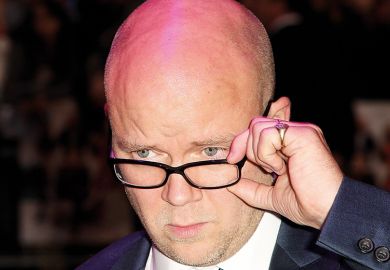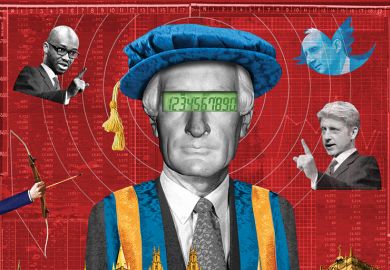Bosses of small for-profit colleges in the UK are earning more than the country’s highest-paid vice-chancellors – with some pocketing payouts in excess of £500,000, Times Higher Education can reveal.
In an investigation of executive pay at alternative providers of higher education, which received £150 million in government-backed tuition fee loans in 2016-17, THE discovered how:
- A small London business college paid a £500,000 bonus to its director
- A second business college paid more than £2 million in dividends and directors' salaries in just three years
- A for-profit music school awarded stocks and shares to directors worth £2 million last year – while its owners paid £3 million to its top-paid director.
Those running for-profit colleges may even be earning far more than their accounts state – with education providers often making large payments to unnamed consultancies or outside companies owned by directors, THE also found.
As for-profit institutions have not yet been required to release annual financial statements in the same way as universities, THE examined accounts for 2016-17 posted at Companies House by 10 institutions which received some of the largest amounts of Student Loans Company funding, and their parent companies.
The highest payouts were made to a director at BPP Holdings – the controlling party of BPP University – which paid one director a total of £881,000 in 2016-17 and £988,000 in 2015-16. BPP University, one of the UK’s three for-profit universities, also paid its highest-paid director £567,000 in 2016-17 and £652,000 in 2015-16, separate accounts show. The university declined to comment on the payments or who received them.
The biggest recipient of SLC loans among alternative providers is currently the British and Irish Modern Music Institute (BIMM), which took about £24.4 million of public money in 2016-17 – about 85 per cent of revenue, its accounts show. Its highest-paid director was paid £197,103 and a further £18,926 in pension payments, while six directors shared £805,974 in total that year. However, accounts for its parent company BIMM Topco show “shares and loan stock of £2,033,314 [were also] due to directors”.
BIMM is owned by Sovereign Capital, a private equity firm, which paid its highest-paid director more than £3 million in 2016-17, its accounts show.
Adam Carswell, chief executive of BIMM, said that the eight-campus institution offered “choice, quality and value for money”. He said that its “unique and differentiated approach” had delivered “strong links to the industries, excellent employment outcomes [and] tuition fees considerably lower than those charged by the traditional universities”.
Another Sovereign Capital-owned alternative provider, Greenwich School of Management, received almost £20 million from the SLC last year, but has yet to publish its accounts for 2016-17. Accounts for the previous year for its parent company, Clipper Group, show its highest-paid director received £432,941, including £192,756 in severance pay.
The disclosures follow widespread criticism of the remuneration of vice-chancellors at UK universities. The country’s best-paid vice-chancellor, the University of Bath’s Dame Glynis Breakwell, announced her retirement last November after months of criticism of her £468,000 remuneration.
Sally Hunt, general secretary of the University and College Union, said that “far greater transparency” was required from for-profit colleges in receipt of public funds, adding that “opaque financial statements appear designed to confuse and it is often impossible to work out who is being paid what or what for”.
For-profit colleges that “do not even have to conform with the minimum standards of accountability that our universities [do had] managed to stay in the shadows despite [their leaders] being even better remunerated” than vice-chancellors, Ms Hunt said, adding that they should be “subject to the same checks and balances as universities”.
Some of the biggest payments were made at relatively small London business colleges. Icon College of Technology and Management, in Whitechapel, which had about 650 students and eight-full time staff among 41 academic staff last year, paid £578,270 to its managing director Azizur Rahman, including a £500,000 bonus, in 2015-16. Its latest accounts are not yet available, but Mr Rahman, the company’s sole shareholder and director, told THE that “there were and are ample reserves to make this payment without jeopardising…sustainability or the standard of education for our students”.
At the West London College of Business and Management Sciences, in Hounslow, which had 43 staff and 800 students in 2016-17, principal Muhammad Iqbal and deputy principal Muddassar Natt – also its directors – were awarded £135,000 and £67,500 in dividends that year on top of their salaries of £123,650 – almost as much as the £359,861 paid in teachers’ salaries that year.
Dr Iqbal’s and Dr Natt’s dividends were far higher in 2015-16 – £385,000 and £192,500 respectively, while they were paid £485,000 and £225,000 in the preceding year – with overall dividends and salaries exceeding £2 million over the three-year period. Dr Iqbal told THE that this “financial snapshot…does not represent the history of the college” and “directors and shareholders have only taken dividends in [a] few…years” since its foundation in 2005 “despite injecting substantial amounts of money in the previous years”.
At the London School of Science & Technology, its two directors Syed and Hassnain Zaidi were paid a combined £179,840 in salaries, while dividends of £340,000 were paid to shareholders of the family-owned company, of which Syed Zaidi holds a 75 per cent share, its accounts show. In a statement, LSST said the dividends were “paid to all the five shareholders of the company”.
For-profit institutions in receipt of SLC funds will be required to publish their accounts in the same way as universities in future after they came under the remit of the Office for Students in April.
jack.grove@timeshighereducation.com
Executive remuneration at 10 largest UK private providers, 2016-17
| Institution | Remuneration of highest-paid director | Total remuneration to directors | Student Loans Company money received (£millions) | Student Loans Company-funded students |
| British and Irish Modern Music Institute (BIMM) | £197,103 | £805,974, plus shares worth £2 million from parent company | 24.4 | 4,183 |
| Greenwich School of Management (GSM) | £432,941* | £736,136 | 19.9 | 5,525 |
| London School of Science & Technology | Not declared | £179,840, plus £340,000 paid to directors and shareholders in dividends; £1.1 million paid to company under common control | 5.5 | 1,434 |
| BPP University | £881,000; £567,000** | £1.5 million; £1.1 million** | 5.1 | 1,054 |
| London School of Business and Management | £195,000 | £210,000; £1.3 million of profit was “attributable to owners of parent company” Goldwait | 4.5 | 998 |
| Mont Rose College of Management & Sciences | £150,000 | £150,000 | 3.7 | 1,129 |
| St Patrick’s International College | £421,933*** | £421,933*** | 3.7 | 1,509 |
| London Churchill College | £90,739 (paid in dividends) | £90,739; £110,145 paid as “salaries to spouse of directors” | 3.3 | 866 |
| Icon College of Technology and Management | £578,270 | £578,270 | 2.6 | 777 |
| West London College of Business and Management Sciences | Not declared | £123,650, plus £202,500 in dividends to two directors | 2.0 | 506 |
* Paid via Clipper Group, GSM controlling company, includes £192,756 severance payment; 2015-16 figures.
** Paid via BPP Holdings and BPP University respectively.
*** Includes compensation for loss of office of £162,233.
Source: accounts lodged by providers at Companies House. Figures are for 2016-17 unless where stated; SLC figures denote tuition-fee loans for full-time students.
POSTSCRIPT:
Print headline: For-profit UK college heads paid more than v-cs
Register to continue
Why register?
- Registration is free and only takes a moment
- Once registered, you can read 3 articles a month
- Sign up for our newsletter
Subscribe
Or subscribe for unlimited access to:
- Unlimited access to news, views, insights & reviews
- Digital editions
- Digital access to THE’s university and college rankings analysis
Already registered or a current subscriber?








